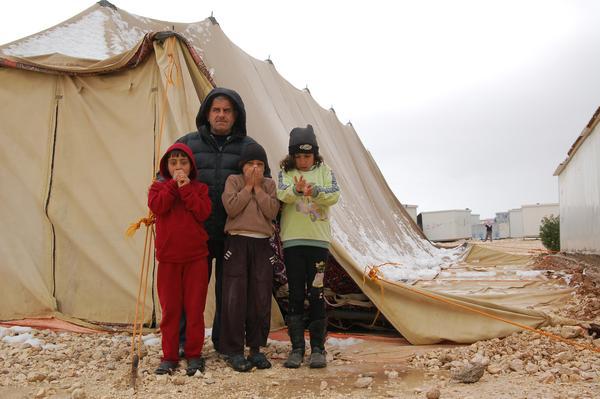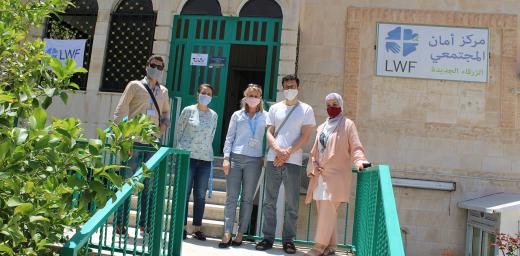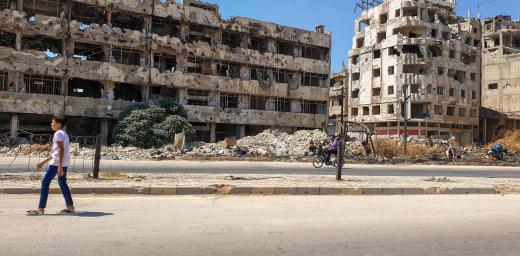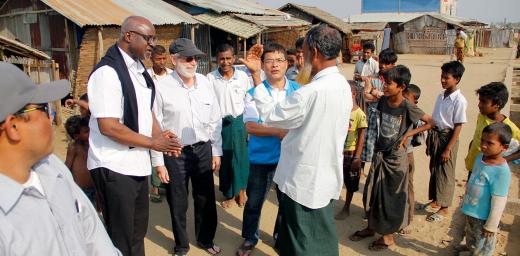Winter Storm Causes Destruction in Za’atari Refugee Camp

A street leader with his children in front of a half collapsed tent which is used as a Mosque. Photo: LWF/ J. Pfattner
Refugees in Camps and Host Communities Most Vulnerable to Extreme Weather
AMMAN, Jordan/ GENEVA, 9 January 2015 (LWI) – The Lutheran World Federation (LWF) has offered its compound in Za’atari refugee camp to shelter Syrian refugees whose tents have collapsed under snowstorm “Huda”. The blizzard hit the Middle East on 7 January. “Jordan is partially covered by snow and the ones suffering most are probably the refugees in the camps and host communities” Josef Pfattner, LWF Interim Team Leader in Jordan, says.
“LWF was able to provide winterization items to 10,000 individuals over the last few weeks”, Pfattner says. In December and in the beginning of January 2,000 families living in host communities each received a gas heater, a gas bottle, two carpets, two blankets and gas refills. “The support was crucial and came in just at the right time” Pfattner says. “We plan to distribute these items to another 415 families but had to postpone due to the weather. We plan to continue in ten days”.
Pfattner visited Za’atari camp the day after the storm where LWF implements a number of projects in a location known as the “Peace Oasis”. “It is also very difficult for the refugees in the camps to cope” he says. “Several tents were blown away and numerous others collapsed over night because of the snow. During the following day, the snow melted. Many places are now flooded”.
Barefoot in the Cold
In Za’atari refugee camp, home to almost 85,000 people displaced by the war in Syria, 15,000 people still live in tents. “The Jordanian authorities, UNHCR and some international NGOs are coordinating the relief efforts by opening additional provisional shelter units for families and by handing out most essential food and non-food items. We from the LWF have offered four of our caravans in the Peace Oasis to be used for temporary shelter” Pfattner adds. The containers are normally used to conduct workshops.
“To me it is almost a miracle how children are coping and to still see a smile in their faces”, Pfattner says. Photos show Syrian children building a snow castle beside their collapsed tent. Many of them wear summer shoes in the muddy cold. “There are still thousands of children who do not have winter shoes in the camp” Ms Wejdan Jarrah, Psycho-social Coordinator for LWF in Jordan says. In conversation however refugees did not mention that fact at all. They only asked to be given caravans instead of tents so they would not have to be afraid of their home collapsing again, Pfattner tells.
“Huda” has brought life in Jordan to a standstill. Public offices are closed, people have stocked up on supplies leaving fuel stations and shelves in the super markets empty. Refugees living in host communities are most vulnerable to these shortages, as they live in old buildings and depend on gas heaters for cooking and warmth. “A gas bottle used to cost 8 Jordanian Dinar, now it’s 15 JD”, Ms Jarrah says. “No refugee could pay that price. Food prices have risen as well, and there is hardly anything to buy in the shops. Because of the snow there are no deliveries. The situation is very difficult”.





